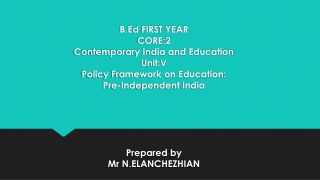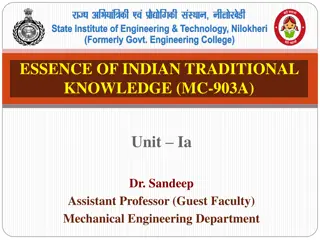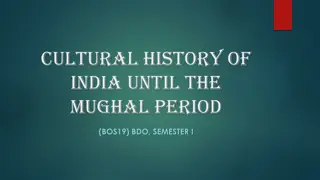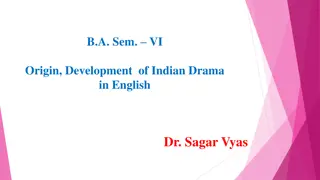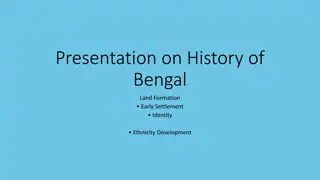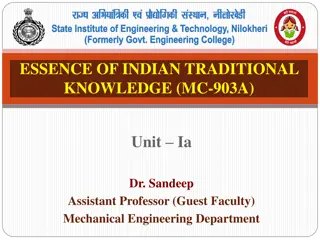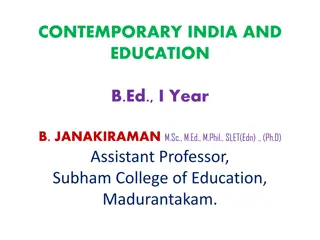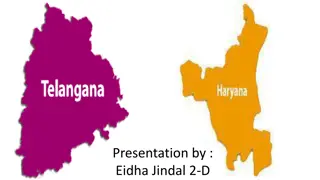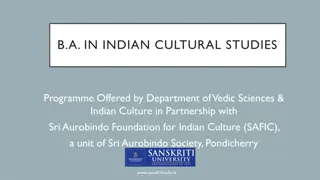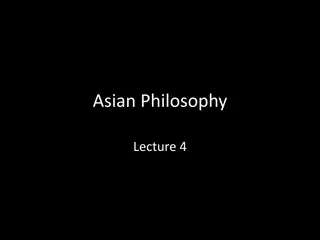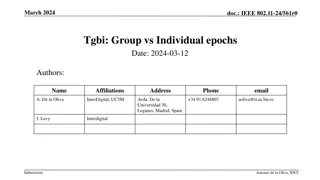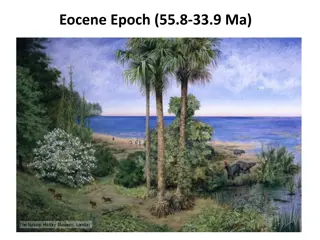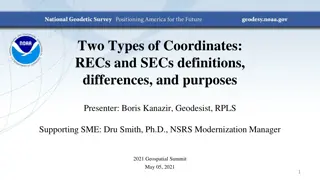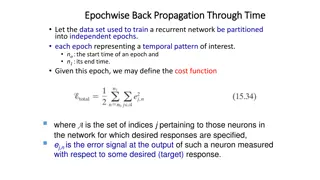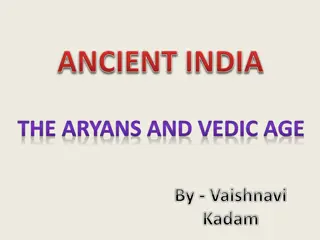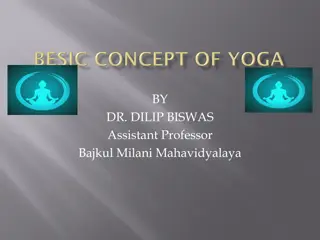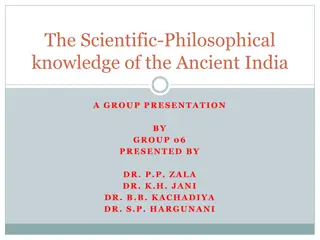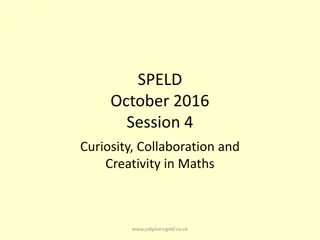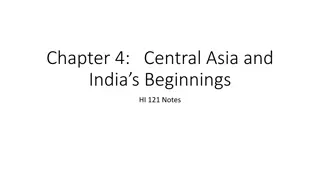Education in Ancient India: Vedic System Overview
The history of education in ancient India traces back to the Vedic system, rooted in the Vedas and emphasizing self-realization and liberation. The curriculum included Vedic literature, arithmetic, geometry, and spiritual studies, fostering academic freedom and discipline among students.
0 views • 9 slides
Women and Education
Women's education in India has evolved over time, from the Vedic period to colonial India. Despite challenges faced in medieval times, efforts have been made to empower women through various forms of education. Education plays a crucial role in shaping the future of women and society as a whole, pro
0 views • 15 slides
Insights into the Holocene Epoch: Climate, Fossils, and Human Migration
Explore the Holocene Epoch through case studies, fossil records, and climate models. Learn about the peak temperatures, environmental changes, and human migration patterns. Discover how past climate conditions are reconstructed using fossils and lake sediments, and delve into the various factors con
2 views • 25 slides
The Essence of Indian Traditional Knowledge: Vedic Culture and History
The Vedas, ancient religious texts of Hinduism, provide essential knowledge about existence and the divine. Believed to have always existed, they were orally transmitted before being written down between 1500-500 BCE in India. The Vedas are considered among the oldest religious works and are categor
1 views • 41 slides
Administration: Ancient, Medieval and colonial
The evolution of administration in India traces back to the earliest monarchial systems in the Vedic period, progressing through texts like Arthshastra and principles of hierarchy. Ancient administrators emphasized decentralization and hierarchical structures. Arthshastra acted as a manual for admin
2 views • 17 slides
Features of Jainism: An Overview Presented by Debajit Hazarika, Assistant Professor
Jainism is an ancient non-Vedic religion with roots tracing back to the times of the Indus Valley Civilization. It emphasizes non-violence, self-conquest, and spiritual liberation through 24 Tirthankaras, with Lord Mahavira being the most significant. Jainism stands out with its rejection of caste d
1 views • 7 slides
Cultural History of India: Early Vedic Period and Aryans
The period of the Aryans in ancient India marked a transition from the Indus Valley Civilization to the Vedic Civilization. The Aryans, possibly migrants from various regions, integrated with the indigenous Dravidians to form the Vedic society. Their culture, as depicted in the Vedas and epics like
0 views • 10 slides
Sri Sri's Thought-Provoking Poetry: An Overview
Sri Sri, popularly known as Srirangam Srinivasarao, was a Telugu poet who revolutionized modern Telugu poetry by addressing contemporary issues. His poem "Forward March" signifies a call for a new classless society, while "Some People Laugh, Some People Cry" reflects his surrealistic vision of urban
0 views • 10 slides
Origin and Development of Indian Drama in English
Indian English Drama has a rich history, starting from the Sanskrit plays of the Vedic Age to prominent playwrights like Rabindranath Tagore and Sri Aurobindo Ghosh. The genre saw a resurgence in the 20th century with significant contributions from various playwrights marking its evolution through s
0 views • 8 slides
Historical Evolution of Bengal: Land Formation & Cultural Development
Ancient Bengal, known as Vanga, witnessed territorial evolution from early Vedic literature to political prominence under different dynasties like Palas and Guptas. The region's history reflects a rich tapestry of cultural change, ethnic identity, and settlement pattern, especially during Buddhist p
0 views • 10 slides
Essence of Indian Traditional Knowledge: Vedic Culture and the Vedas
The Vedas, ancient religious texts of Hinduism, are considered among the oldest in the world, passed down orally before being written in the Vedic Period in India. They contain knowledge about existence, not revealed at a specific historical moment but perceived by sages through deep meditation.
0 views • 41 slides
Vedic Education System in Contemporary India: A Historical Overview
Explore the roots of education in pre-independent India, focusing on the Vedic system with its objectives, curriculum, and Gurukula education model. Learn about the teacher-student relationship and the central role of the teacher in shaping learners' lives. Discover the spiritual and intellectual de
0 views • 22 slides
Rich Culture and Gastronomic Delights of Telangana and Haryana
Explore the vibrant cultural heritage of Telangana, boasting a history of 5,000 years, while savoring its spicier cuisine and traditional attire. Delve into Haryana's mystical charm, steeped in Vedic traditions, and relish its authentic dishes like Bajra Aloo Roti and Kachri Ki Chutney.
0 views • 12 slides
Rise of Janapadas and Mahajanapadas in Vedic India
The rise of Janapadas and Mahajanapadas marked a significant transition in the political landscape of Vedic India. Janapadas, major kingdoms of that era, evolved into more powerful Mahajanapadas through territorial expansion and urbanization. The shift from tribal polities to territorial states led
0 views • 9 slides
Comprehensive Campus Recruitment Training (CRT) Program
Enhance your skills with our Campus Recruitment Training (CRT) program covering various topics such as aptitude tests, Vedic Mathematics, verbal reasoning, logical deductions, and more. Access study materials, online mocks, and hands-on sessions to prepare for company-specific interviews and tests.
0 views • 11 slides
Education in Ancient India: Vedic System Overview
Education in ancient India began with teaching traditional elements like Indian religions, mathematics, and logic. The Vedic system of education was based on the Vedas, focusing on spiritual and materialistic knowledge. The ultimate aim was self-realization and liberation of the soul. The curriculum
0 views • 9 slides
B.A. in Indian Cultural Studies Programme by Department of Vedic Sciences & Indian Culture
Explore the B.A. in Indian Cultural Studies programme offered by the Department of Vedic Sciences & Indian Culture in partnership with Sri Aurobindo Foundation for Indian Culture. Delve deeper into the spiritual foundations, history, and key contributions of Indian civilization while preparing for a
0 views • 13 slides
Traditional Food Practices and Beliefs in India, Pakistan, and Bangladesh
Explore the historical background and traditional beliefs surrounding Indian, Pakistani, and Bangladeshi foods. Discover the differences in religious practices, the influence of Vedic scriptures on food choices, and the categorization of foods into Sattvic, Rajasic, and Tamasic categories based on t
1 views • 29 slides
The Two Trends of Indian Philosophy: Naturalism vs. Spiritualism
Indian philosophy is characterized by two dominant trends - naturalism/materialism and spiritualism/theism. The Charvaka school represents the naturalistic perspective, rejecting Vedic authority and advocating for materialism. They emphasize perception as the sole source of knowledge and deny concep
0 views • 15 slides
Investigating Heavily Obscured AGN in the X-ray Background Epoch
R. Gilli and colleagues study heavily obscured AGN, particularly Compton-thick AGN, to understand their contribution to the missing X-ray background. They explore selection techniques, space density, and spectroscopic surveys to shed light on the evolution and characteristics of these elusive object
0 views • 15 slides
Discussion on IEEE 802.11 Group vs. Individual Epochs
Trigger discussion on differences between group and individual epochs in IEEE 802.11 standards. Group epochs involve simultaneous transitions of MAC parameters by all or selected STAs based on AP trigger, while individual epochs allow each STA to independently change its parameters. Key points inclu
0 views • 4 slides
Overview of Cenozoic Epochs from Eocene to Pleistocene
Explore the key epochs of the Cenozoic Era, including Eocene, Oligocene, Miocene, Pliocene, and Pleistocene, each characterized by distinct geological and biological changes over millions of years. Follow the evolution of Earth's climate, flora, and fauna through captivating images representing each
0 views • 5 slides
Understanding REC and SEC Coordinates in Geodesy
Geodesist Boris Kanazir and NSRS Modernization Manager Dru Smith delve into the definitions, differences, and purposes of Reference Epoch Coordinates (RECs) and Survey Epoch Coordinates (SECs) at the 2021 Geospatial Summit. OPUS coordinates, SEC computation by NGS every four weeks, REC re-computatio
0 views • 17 slides
Epochwise Back Propagation Through Time for Recurrent Networks
In the context of training recurrent networks, Epochwise Back Propagation Through Time involves dividing the data set into independent epochs, each representing a specific temporal pattern of interest. The start time of each epoch, denoted by 'no', is crucial for capturing the sequential dependencie
0 views • 28 slides
The Aryans and Vedic Age - An Overview of Early and Later Vedic Periods
The Aryans, believed to have originated from Central Asia, played a significant role in shaping the Vedic Age in ancient India. This period saw the emergence of key political, economic, and religious developments, contributing to the foundation of Hinduism. From the Early Vedic Period characterized
0 views • 19 slides
Understanding the Paths of Yoga: Karma, Bhakti, Gyana, Raj, and Hatha Yoga
Yoga, originating from Vedic scriptures, offers paths like Karma, Bhakti, Gyana, Raj, and Hatha Yoga to attain the ultimate reality. Each path focuses on different aspects such as action, devotion, knowledge, and physical practice, leading to a holistic development of the mind and body.
0 views • 11 slides
Mitigating Client Frame Tracking in IEEE 802.11 Networks
Unencrypted and predictable frame fields in IEEE 802.11 networks can lead to client frame tracking, compromising user privacy. The Client Frame Tracking Countermeasures (CFTC) proposal aims to prevent tracking across epoch boundaries by obfuscating critical fields like PN, SN, and AID. Each epoch, l
0 views • 17 slides
Ancient Indian Scientific and Philosophical Knowledge: A Remarkable Insight
Explore the profound scientific and philosophical insights of ancient India as presented by Group 06 with a focus on remarkable achievements like the velocity of light, the Big Bang theory, Vedic astronomy, and concepts such as the heliocentric solar system. Dive into ancient texts like the Rig-Veda
0 views • 22 slides
Exploring Curiosity and Creativity in Mathematics
Delve into the fascinating world of mathematics through the lens of curiosity, collaboration, and creativity. Uncover the impact of curiosity on memory, the magic of mathematics explained by Bharati Krishna, and intriguing Vedic math techniques. Discover the art of proposing questions in mathematics
0 views • 58 slides
Certificate Courses in Indian Cultural Studies by Department of Vedic Sciences & Indian Culture
Explore month-long certificate courses in Indian Cultural Studies offered by the Department of Vedic Sciences & Indian Culture in collaboration with Sri Aurobindo Foundation for Indian Culture. Delve into India's rich cultural heritage to gain insights into ancient wisdom traditions, prepare for con
0 views • 8 slides
Early Civilizations and Trade Networks in Central Asia and India
The chapter explores the Indus Valley Civilization, early trade routes, and urbanized societies like Mohenjo-Daro and Harappa in India. It delves into the significance of Central Asia's steppe lands, the Vedic Epoch, and the cultural developments in the region during ancient times.
0 views • 19 slides
